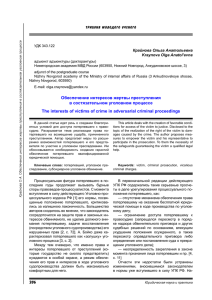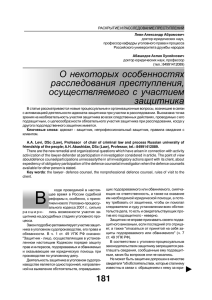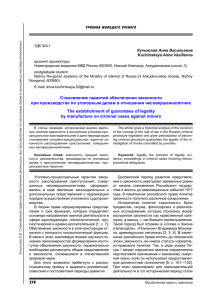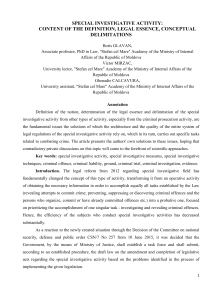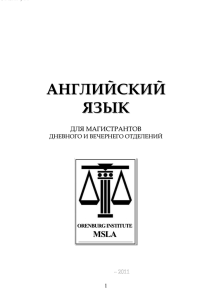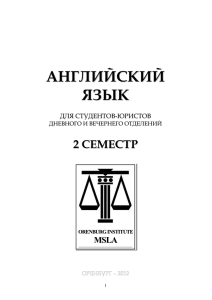Truth seeking in modern investigatory and
advertisement

D ALLA C OMUNITÀ I NTERNAZIONALE NIKOLAY G. STOYKO Truth seeking in modern investigatory and adversarial systems of criminal procedure SUMMARY: 1. Introduction. – 2. Truth seeking in criminal-political context. – 3. Truth seeking in comparative law context. – 4. Conclusions 1. Introduction Traditionally truth seeking in criminal procedure is a debating point in Russian legal literature. Researchers debate (sometimes fiercely): whether truth seeking is an objective of the criminal procedure; is it compatible with adversarial criminal procedure; if objective truth exists or it is just a legal formalisation; is a negation of truth seeking as objective of criminal procedure means negation of objective and comprehensive inquiry . Proposal to incorporate principle of objective truth into Criminal Procedure Code of the Russian Federation has triggered heated debates and put forward new issues for discussion. For example, in his article prof. A.S. Alexandrov analysing whether prospective change (effectively, counter-reform) is just return to the past, a retrograde step (in legal and political respect) equivalent to denial of Russian criminal procedure modernisation . Despite the significance of raised issues, it should be noted, that mostly all discussions of scientific society lacks criminal-political and comparative law aspects. As a result, a practical discussion shifts into being purely abstract one. 1 2 3 Азаров В.А. Уголовно-процессуальный кодекс Российской Федерации: двойные стандар-­‐ ты в установлении истины? Вестник Томского государственного университета. Сер. Экономика. Юридические науки. 2003. 4. (Azarov V.A. Criminal Procedure Code of Russian Federation: double standards in truth seeking? Bulletin of Tomsk State University. Ser. Economy. Legal sciences. 2003. 4). Draft of the federal law “Amendments to the Criminal Procedure Code of the Russian Federation in relation to the introduction of the objective truth principle”; website of the Investigation Committee of Russian Federation (www.sled.com). Александров А.С. Состязательность и объективная истина Библиотека криминалиста. Научный журнал. 2012. (Alexandrov A.S. Adversarial method and objective truth // Criminalist library. Scientific magazine. 2012. № 3, p.142-156. 1 2 3 ARCHIVIO PENALE 2015, n. 1 2. Truth seeking in criminal-political context The object of truth seeking “is so obvious in modern criminal justice that it is not worth talking about” . After all, it is hard to imagine existence of criminal procedure, which is unable to solve real crime and establish guilt of offenders. In this respect, any national criminal procedure is truth oriented. Otherwise, it will not meet social need in crime control, which determines and justifies its existence. Thereof it does not matter whether it is criminal procedure of democratic or a non-democratic society or what type of criminal procedure is in question (Romano-Germanic inquisitorial or Anglo-American adversarial). It is quite a different matter when it comes to protection of human rights and fundamental freedoms in criminal procedure. It is essential (as a key condition for establishment of the truth) and justified (as a key condition for enforcement of the right to justice) only in democratic societies and states (regardless of national type of relevant criminal justice system). In other words, none of the mentioned types of criminal procedure has a monopoly on truth (Romano-Germanic) or justice (Anglo-American). Moreover, in the modern context both types of the criminal procedure are committed to the truth and justice as significant social values and aim to maintain them in balance. Russian and Western legal literature acknowledges protection of the accused person rights and freedoms as a priority objective of criminal procedure alongside with protection of society and crime victims. It is also an essential condition that should be observed in pursuit of fundamental objective of criminal procedure: crime prevention, conviction of offenders, acquitment of innocent . In any case, views of the researchers are aligned on relevant values (regardless of name, such as purpose, objective, goal, instrument or condition). Ramsey Clark states that there will be no order nor justice unless they co-exist . It is understandable since currently it is impossible to imagine total crime control nor unlimited protection of human rights. 4 5 6 Йорг Н., Фильд С., Брантс К. Происходит ли сближение следственной и процессуальной систем? Сборник текстов: Основные принципы современного уголовного права. Ч 1. Предмет 1. Статья 2. Тилбург: Тилбург. ун-т, 1997 (Jorg N., Field S., Brants K. Is there a convergence of inquisitorial and procedural systems? Collected materials: Main principles of modern criminal law. Part 1. Subject 1. Article 2. Tilburg; Tilburg University, 1997,p.16. Барабаш А.С. Природа российского уголовного процесса, цели уголовно-процессуальной деятельности и их установление. СПб., 2005 (Barabash A.S. Nature of Russian criminal procedure, objectives of criminal procedure and its definition. St. Petersburg, 2005, 94-103; Ashworth A. The Criminal Process: An Evaluative Study. Oxford, 1998, p.66. Кларк Р. Преступность в США: Замечания по поводу ее природы, причин, предупреждения и контроля. 2-е изд. М., 2002 (Clark Ramsey. Crime in America: Observations 4 5 6 2 ARCHIVIO PENALE 2015, n. 1 The question is not only how to find the balance, but who will be able to find it between imminence of a prosecuting offence, accompanied by restriction of rights and freedoms and risk of punishment of innocent, and necessity to keep high standard of human rights and freedoms protection, accompanied by restriction of authorities prerogative powers and possibility of unpunished crime. Many researchers agree that this kind of balance is not easy to reach and it needs thorough theoretic approach . In this context, we should be quite cautious about the idea of “existence of criminal procedure along with criminal law” based only on necessity to prevent conviction of innocent people . Supporters of this approach refer to the concept of self-limitation of the state in criminal procedure by exercising independent judicial authority not involved in detection of crime and offenders [15; 17, s. 8-22]. In itself, the above-mentioned concept is beyond exception (at least in this context). However it is being use as a base of attempt to exclude widely used justification of criminal procedure as a necessity to control crime (detection of crime and offenders) or exercise states right to punishment. In fact, supporters of above approach are artificially dividing values of criminal prosecution and protection of human rights and freedoms . Instead of looking for criminal-political and legislative balance of personal and public interests in criminal procedure , they are setting them against each other (which is unacceptable). Constitutional Court of Russian Federation underlines that within the scope of public-law principle of criminal prosecution the protection of human rights and freedom, is guaranteed to “people who are under such prosecution…and other interested parties, including victims of the crime…” . 7 8 9 10 11 on its nature, causes, prevention and control / Second ed. M., 2002, p.473. Шадрин В. С. Обеспечение прав личности при расследовании преступлений. М., 2000 (Shadrin V.S. Protection of individual rights in criminal investigation. M., 2000, 16) Мизулина Е.Б. Совершенствование уголовно-процессуального законодательства: Проект УПК Российской Федерации. Информационный бюллетень Следственного комитета при МВД России. 2001. № 1 (107) (Mizulina E.B. Improvement of criminal procedure legislation: Draft Criminal Procedure Code of Russian Federation. Information bulletin of Investigatory Committee, Ministry of Internal Affairs. 2001. № 1 To be fair, it should be pointed out that I.B. Mikhailovskaya integrates specified values in her argumentation. I.L. Petruhin repeatedly called attention to ensuring balance of specified values [20, s. 17]. Постановление Конституционного Суда Российской Федерации от 16 мая 2007 г. «По делу о проверке конституционности положений статей 237, 413 и 418 Уголовнопроцессуального кодекса Российской Федерации в связи с запросом президиума Курганского областного суда» // Российская газета. – 2007. – 2 июня (Constitutional Court of Russian Federation Ruling from 16 of may 2007 « Constitutional review of articles 237, 413 and 418 of Criminal Procedure Code subsequent to inquiry of Kurgan regional Court” // Russian Newspaper. 7 8 9 10 11 3 ARCHIVIO PENALE 2015, n. 1 This approach contrasts with approach of supreme constitutional bodies in countries of common law (in relation to adversarial proceedings, supported by authors of above opposition). For example, Supreme Court of United States of America repeatedly underlines in its decisions that courts preventing police abuse of authority are acting in public interests and not contributing offenders to escape responsibility and police to correct their mistakes. Moreover, not only reviewed approach is “breaking bond between criminal law and criminal procedure”, but, by doing so it is downsizing and distorting content of court functions . The court is becoming a body that determines law as a result of a battle between state and a citizen rather than constitute law as coordination of criminal prosecution values, human rights and freedoms in each specific case. This could not be anymore wrong. Understandably, court cannot control crime the way investigation and prosecution bodies do, but at the same time, it cannot stand aside from this process. Modern theoretic discussions are closely echoing scientific debates of wellknown Russian (czarist) authors (brief summary by M.A. Celtsov-Bebutov . In apt words of respectful Russian scholar I.V. Mikhailovsky court has to be “impersonal, composed, reasonable and powerful crime control supervisor that mitigates any extremes” . There is an idea of “cultural inherent value” of independent justice that has guiding and binding effect in given context and stands behind modern criminal-political realias . This is why legal discussion whether truth seeking (in other words crime and offenders detection and thus prevention of innocent people prosecution) is an object of Russian criminal procedure (an equally any other national criminal procedure) is meaningless in criminal-political context. 12 13 14 15 16 3. Truth seeking in comparative law context. Whenever truth seeking is being discussed as the aim of modern criminal procedure, it is necessary to note practical aspects. It is not worth to analyse 2007. 2 of June). Чельцов-Бебутов М.А. Советский уголовный процесс. Вып. 1. Харьков, 1928 (CheltsovBebutov M.A. Soviet criminal procedure. Issue 1, Kharkov, 1928, 4-5). Строгович М.С. Природа советского уголовного процесса и принцип состязательности. М., 1939 (Strogovich M.S. Nature of soviet criminal procedure and adversarial principle. M., 1939, 84). Чельцов-Бебутов М.А. Советский уголовный процесс. Вып. 1. Харьков, 1928 (CheltsovBebutov M.A. Soviet criminal procedure. Issue 1, Kharkov, 1928,1-6). Михайловский И.В. Основные принципы организации уголовного суда. Томск, 1905 (Mikhailovsky I.V. Main principle of criminal court organisation. Tomsk, 1905, 94). Розин Н.Н. Уголовное судопроизводство. СПб., 1914 (Rozin N.N. Criminal justice. St. Petersburg, 1914,42). 12 13 14 15 16 4 ARCHIVIO PENALE 2015, n. 1 the nature of the truth (objective, relative, substantive of legal) within legal science unless someone is trying to “make” law enforcer to follow the directive: each crime can and must be solved. Fallacy of this directive is evident as well as its implementation (refusal to take and register reports of a crime, tampering with records, abuse of coercive power, etc.). Respected British researcher G. Fletcher has noted that faultless proceedings means complete elimination of mistake, which unfortunately is an utopia. Courts will be making mistakes even if procedural rules designed well enough to guarantee truth and protect rights and dignity of the accused . Russian researchers are holding similar opinion . However, it does not mean that truth cannot be considered as a rational ideal, which is almost impossible to reach due to natural and legal limitation of procedural the knowledge. The role of this ideal (ideal objective) is to keep parties of proceedings “on track” and lead them to conclusions corresponding reality to the extent determined by means of proving . Given this, we have to focus on truth (and justice) seeking methods in inquisitorial and adversarial systems of criminal procedures. Inquisitorial method – is a method of objective and comprehensive criminal case inquiry in order to establish the truth. Authorities involved in criminal proceedings should not maintain one pre-defined position, but have to set out and examine all possible leads of accusatory and exculpative nature in order to establish facts necessary to protect legal interests of defendants and victims. As a result everything should be excluded except one version (when there is a system where each evidence is necessary and all evidence is enough for substantiated and convincing response to all questions raised in court) and true decision should be made. It should be emphasized that inquisitorial method is typical for pre-trial proceedings (having distinctly inquisitorial nature) regardless of the national criminal procedure type. However, this method has fundamental meaning for criminal procedure of countries with Romano-Germanic legal system (such as Austria, Germany, Netherlands, Spain, Portugal, France) where court has to do such inquiry and expand it to all facts and evidence important to solution of a case (including a decision to seek additional evidence, residing outside of public prosecution). In Russian criminal procedure court does not have such 17 18 19 Флетчер Дж., Наумов А. В. Основные концепции современного уголовного права. M., 1998 (Fletcher George P., Naumov A.V. Basic concepts of modern criminal law. M., 1998, 505) (Fletcher’s part translated from English). Назаров А.Д. Влияние следственных ошибок на ошибки суда. СПб., 2003 (Nazarov A.D. Effect of investigative mistakes on judicial mistakes. St. Petersburg, 2003). This is in focus, particularly in German legal literature [14, s. 117-118]. 17 18 19 5 ARCHIVIO PENALE 2015, n. 1 authority (it is bounded by the limits of indictment), although its subsidiary (to parties) investigative activity in most of the cases is constitutive for the criminal case outcome. Adversarial method (method of procedural justice) implies that two parties assume opposing positions in a debate of guilt or innocence by presenting and examining evidence in court. Both parties seeking and presenting only the evidence relevant to the adjudication of the case by court. As long as the judicial process is in a form of debate, parties offer their version of events and contest version of the opposite party by the certain rules – choice of the only true version is left to the adjudicator. “Weak” evidence, reasoning and arguments are withheld and “Strong” are kept. Based on the evidence the adjudicator decides whether defendant is guilty beyond any reasonable doubt and determines the sentence. It is assumed if the adjudicator and parties are using common strict rules and standards of proof beneficial to establishment of truth (and justice) and if the adjudicator observes its compliance (during trial and pre-trial, exercising judicial control and providing principle of “equality of opportunity”) that result will be true. Such result due the high authority of judicial decision has overall impact to criminal procedure, motivating the prosecution not to present “weak” charges, dismiss a prosecution or to compromise with defendant. This also motivates the defence not to risk pleading not guilty without serious arguments and counterarguments . Method of procedural justice is predominating in criminal procedure of the common law countries (such as England and Wales, Australia, USA) determining adversarial nature of criminal justice. In Russian criminal procedure, this method is only applicable to the jury trial and not applicable directly to judge (bench) trial. Given this, it may be concluded that adversarial and inquisitorial methods are contentwise addressing to establishment of truth (and justice). However, it would be misleading to say that use of one method eliminates presence of other method’s elements in criminal procedure of the same type. It would be exaggeration to say, even in regards to the professional judge in Anglo-American procedure, that he is just a referee neutral to the truth. In fact, judge is not always neutral to inquiry, as he is able to control trial expressly or implicitly and influence the outcome of the case. Thus it is allowed to instruct jury, monitor procedural conduct of the parties, bind parties to provide written statement of positions before trial, dismiss doubtful evidence, to remind arguments of the parties to the jury, emphasize important details, ad20 Stated is an interpretation of the different author’s views [33, s. 34–35, 52–54, 56, 58–60; 42, p. 60– 61; etc.]. 20 6 ARCHIVIO PENALE 2015, n. 1 vise on evaluation of evidence, etc.. In other words, judge indirectly (through jury and parties) establish conditions when procedure has to comply with request to seek truth. Therefore, judge can “use other’s hand” to encourage objective and comprehensive inquiry. Judge exercising investigative power is not an exclusion. For instance, American judge can intervene and independently call and examine a witness, directly examine witnesses regardless who call the witness (rule 614, Federal rules of evidence), to appoint an expert (rule 706, Federal rules of evidence). Such manifestation of inquisitorial elements in adversarial procedure is not accidental. After all adjudicator has to exclude one of the presented versions and identify most reasonable one even if parties positions were not well reasoned (which often can be seen in practice) . Consequently, adversarial method does not negate truth as objective (even if it is only able to provide maximum probability of establishing guilt or innocence) and is under certain effect of inquisitorial method allowing to compensate apparent “evidentiary” weakness of “trial by combat” (when result can be arithmetically calculated in “win-loss” system). Romano-Germanic criminal procedure also has elements of the adversarial method. Firstly, even though, adversarial argument between parties in court is possible, it takes place in the presence of high (sometimes suppressive) investigative activity of the adjudicator. This can make argument between parties pointless. This is why, for instance, French and German researchers practically lay aside concept of parties in criminal procedure and talking about joint adjudication of the dispute by prosecutor, defender and judge. Secondly, trial in criminal procedure of inquisitorial type involves judicial pleadings (oral arguments), which are “pure” dispute (if, of course, positions of the parties have not converged during the evidence examination). Formally, there is an element of adversarial method. Moreover, its application, at least theoretically, can affect adjudicators’ decision (especially its unprofessional part). Thirdly, the principle of fair trial has a great significance in inquisitorial procedure (mostly under influence of European Convention on Human Rights). This stimulates adversarial argument between parties even if it is taking place in presence of suppressive investigative activity of the court. Necessity and significance of ensuring this principle prevents judge to intervene in the defence and prosecution activity and take into account their opinion and arguments. 21 Криминология / Под ред. Дж. Ф. Шели. СПб.,2003 (Criminolgy / Edited by Joseph F. Sheley. St. Petersburg, 2003). (translated from). 21 7 ARCHIVIO PENALE 2015, n. 1 22 At least they enjoy “possibility to argue, contest, examine each other” classified as most significant criteria of Anglo-American adversarial system. Above does not eliminate evident differences between inquisitorial and adversarial methods (rather in functional-procedural than objective–oriented respect), but allow to conclude that objective to establish truth is equally significant for both types of criminal procedure. 4. Conclusions Based on the foregoing it can be assumed that establishment of truth (along with justice) is equally significant objective of modern criminal procedure of any type. Herewith truth is ideal as cognitive objective and real as cognitive result. Hence, in criminal procedure, truth always has nature of legally formalised judicial truth, which is more or less close to reality (beyond reasonable doubt). In this (and other) respect, establishment of truth as objective of criminal procedure does not confront its “adversariality”, regardless whether it’s based on procedural justice method or its only elements of parties adversarial argument based on article 6 of European Convention on Human Rights. This is why negation of establishment of truth as objective of criminal procedure, though theoretically tempting, does not mean negation of objective and comprehensive inquiry, even if it is only a contraposition of two versions – defence and prosecution. It is just an adversarial approach to establishment of truth (trial by combat) which is successful mainly thanks to the most reasonable version left after pre-trial investigation. Hence the attempt to design and implement “ultramodern” model of classical adversarial criminal procedure (impartial adjudicator-referee, active parties, procedural equality) in Russia not only means a change of “continental” paradigm of Russian criminal procedure , but also switch to something nonexistent in modern state-organised world (theoretical illusion). This attempt is fairly criticised in literature . 23 24 Фридмэн Л. Введение в американское право. M., 1962 (Friedman L. Introduction to American law. M., 1992, 61) (translated from English). Головко Л.В. Новый УПК Российской Федерации в контексте сравнительного уголовнопроцессуального права // Государство и право. 2002. № 5,51-54 (Golovko L.V. New Criminal Procedure Code of Russian Federation in context of the comparative criminal procedural law // State and Law magazine. 2002. № 5,p.51-54). Азаров В.А. Уголовно-процессуальный кодекс Российской Федерации: двойные стан-­‐ дарты в установлении истины? // Вестник Томского государственного университета. Сер. Экономика. Юридические науки. 2003. № 4. (Azarov V.A. Criminal Procedure Code of Russian Federation: double standards in truth seeking? // Bulletin of Tomsk State University. Ser. Economy. Legal sciences. 2003. №4). 22 23 24 8 ARCHIVIO PENALE 2015, n. 1 Statements that inquisitorial criminal procedure is particularly effective in truth seeking but not fair (prone to abuse of discretion) and adversarial criminal procedure is fair but not effective in truth seeking are not less delusive (practically dangerous). In other words, one type of procedure is better than another and vice versa. In fact, as commonly noted in comparative law researches, each type of criminal procedure has its strengths and weaknesses . Moreover, types of procedure are ideal models and cannot be “evaluated outside of legal, political, social and historical context…” as long as “worst model can work well in certain cultural environment and, contrarily, the best model can end in fiasco if it’s implemented in the wrong context” . It seems that Russian criminal procedure is currently in the same situation. Certainly, reform of criminal procedure legislation was practically justified (and stays justified) , as well as counter-reform of Investigation Committee of Russian Federation. As it was emphasized by leading legal scholar V.D. Spasovich, that it is “better to make free 10 and 100 guilty people than convict one innocent, but that it would not be better if legislation will change system to minimise chances of criminals impunity without minimising judicial guarantees to innocent” . Neither reform nor counter-reform can be successful in terms of promoting human rights and effectiveness of truth seeking unless main participants of criminal proceedings (courts, police, public prosecution and defence) and their specific issues are not taken into account . This is a reason not to concentrate efforts of national legal scholars on reform of Russian criminal procedure in the name of fighting injustice and counterreform criminal procedure under the name of fighting crime, but to change 25 26 27 28 29 Criminal procedure. A Worldwide Study. Durham, North Carolina, 2007,12-25. Винтер Л.Б. Основные черты предварительного расследования (США) // Предваритель-­‐ ное расследование в уголовном процессе стран Центральной Азии: между инквизици-­‐ онной и состязательной моделью / Под общ. ред. Ф.-К. Шредера и М. Кудратова. Frankfurt am Main, 2012 (Main characteristics of pre-trial investigation (USA) // Pre-trial investigation in criminal procedure of Central Asia countries: inquisitorial and adversarial models / Edited by F.-K. Shreder and M. Kudratov. Frankfurt am Main, 2012). Стойко Н.Г. Уголовный процесс России: история и перспективы развития // Уголовное судопроизводство: теория и практика / Под ред. Н.А. Колоколова. М., 2014,112 (Stoyko N.G. Criminal procedure in Russia: history and perspectives // Criminal justice: theory and practice / Edited by N.A. Kolokolov. M., 2014, 112. Спасович В.Д. О теории судебно-уголовных доказательств в связи с судоустройством и судопроизводством. М., 2001 (Spasovich V.D. Theory of judicial criminal evidence in relation to judicial administration and judicial proceedings. M., 2001). Тальберг Д.Г. Русское уголовное судопроизводство. Т. 1. Киев, 1889 (Talberg D.G. Russian criminal justice. Part 1. Kiev, 1889). 25 26 27 28 29 9 ARCHIVIO PENALE 2015, n. 1 what was “historically distorted for reasons beyond control of modern legislator” . It is long overdue to defer the appeal of scholars like professor L.V. Golovko and switch form abstractive-theoretical or “ideology-driven” debate about truth to discussion about related issues of conceptual unification (not excluding possibility of certain technical differentiation) and differentiation of police, prosecution and court authority under criminal cases (on substantive, procedural and institutional levels) . 30 31 Головко Л.В. Реформа полиции в контексте модернизации предварительного произ-­‐ водства в российском уголовном процессе // Уголовная юстиция: связь времен. Избран-­‐ ные материалы международной научной конференции / Сост. А.В. Смирнов, К.Б. Кали-­‐ новский. М., 2012 (Golovko L.V. Police reform in the context of the pre-trial investigation’s modernisation in Russian criminal procedure // Criminal justice: link of times. Collected materials of international scientific conference/ Content by A.V. Smirnov, K. B. Kalinovsky. M., 2012). Головко Л.В. Реформа полиции в контексте модернизации предварительного произ-­‐ водства в российском уголовном процессе // Уголовная юстиция: связь времен. Избран-­‐ ные материалы международной научной конференции / Сост. А.В. Смирнов, К.Б. Кали-­‐ новский. М., 2012 (Golovko L.V. Police reform in the context of the pre-trial investigation’s modernisation in Russian criminal procedure // Criminal justice: link of times. Collected materials of international scientific conference/ Content by A.V. Smirnov, K. B. Kalinovsky. M., 2012). 30 31 10
